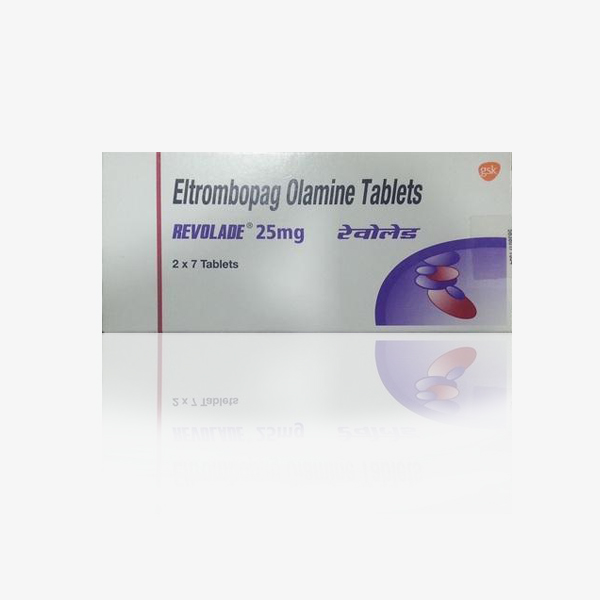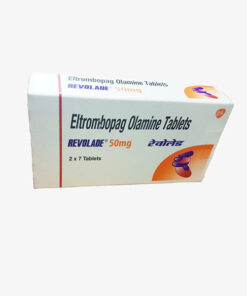Buy Revolade : Eltrombopag 25 mg Tablets Online
$177.14
Brand Name: Revolade
Active Ingredient: Eltrombopag
Manufacturer: GlaxoSmithKline (GSK) Pharmaceuticals Ltd.
Strength: 25 mg
Dosage Form: Tablet
Packaging: Pack of 14 Tablets
Prescription Required *
Revolade (eltrombopag) 25mg tablets is a medication used to treat thrombocytopenia (low platelet count) in patients with chronic immune thrombocytopenia (ITP) or hepatitis C virus (HCV)-related cirrhosis. This medication stimulates the production of platelets in the bone marrow.
Composition:
Revolade contains eltrombopag olamine, and each tablet contains 25 mg of eltrombopag. The inactive ingredients include lactose monohydrate, microcrystalline cellulose, croscarmellose sodium, colloidal silicon dioxide, and magnesium stearate.
Uses:
Revolade is used to treat thrombocytopenia in patients with chronic immune thrombocytopenia (ITP) and hepatitis C virus (HCV)-related cirrhosis. In patients with ITP, revolade is used when other treatments have failed. In patients with HCV-related cirrhosis, revolade is used to increase platelet counts and reduce the risk of bleeding during medical procedures.
Usage and Dosage:
Revolade is available as 25mg, 50mg and 75mg tablets, which should be taken orally with or without food once daily. The recommended dosage may vary depending on the underlying condition and the patient’s platelet count. Patients should not exceed the maximum daily dose of 75mg. The medication is usually prescribed for an extended duration, and patients should continue to take the medication as directed by their healthcare provider.
Storage Conditions:
Revolade should be stored at room temperature between 15°C to 30°C. The medication should be kept in its original container and should be protected from light and moisture. The product should be kept out of reach of children.
Mechanism of Action:
Revolade stimulates the production of platelets by binding to and activating the thrombopoietin (TPO) receptor found on the surface of the megakaryocyte, a progenitor of platelets. This binding promotes the differentiation, maturation, and proliferation of megakaryocyte, which leads to an increase in platelet production.
Contraindications:
Revolade is contraindicated in patients with a history of thromboembolism and in patients with severe liver impairment. The medication should not be prescribed to patients with liver disease other than chronic hepatitis C virus (HCV)-related cirrhosis.
Interactions:
Revolade may interact with certain medications, including anticoagulants, nonsteroidal anti-inflammatory drugs (NSAIDs), and some antibiotics. Patients should consult their healthcare provider before taking any new medications while taking revolade.
Side Effects:
Side effects of revolade may include nausea, vomiting, diarrhea, headache, fatigue, and changes in taste. Patients may also experience rash, muscle pain, or fluid retention. More serious side effects may include thromboembolic events, hepatotoxicity, and bone marrow suppression. Patients should report any unusual symptoms to their healthcare provider immediately.
Be the first to review “Buy Revolade : Eltrombopag 25 mg Tablets Online” Cancel reply
Related products
Anaesthetics





Reviews
There are no reviews yet.